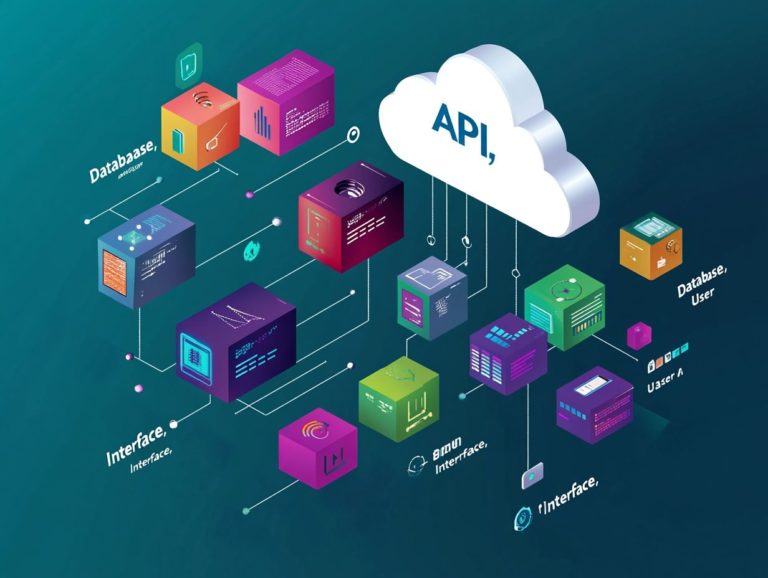Exploring Industry-Specific PaaS Solutions
In today s fast-paced digital landscape, Platform as a Service (PaaS) stands out as a true game-changer for businesses across various industries.
This article delves into the intricacies of PaaS and its tailored applications designed to meet specific industry needs. You ll explore various types of PaaS solutions and uncover their unique benefits.
Gaining insights on key features to consider when making your selection will help streamline your operations.
Real-world case studies will showcase successful implementations, while we also tackle potential challenges and the strategies to navigate them. Jump in and see how PaaS can transform your business today!
Contents
- Key Takeaways:
- Types of Industry-Specific PaaS Solutions
- Benefits of Using Industry-Specific PaaS Solutions
- Key Features to Look for in a PaaS Solution
- Case Studies of Successful Implementations
- Challenges to Consider with Industry-Specific PaaS Solutions
- Frequently Asked Questions
- What is the definition of industry-specific PaaS solutions?
- How do industry-specific PaaS solutions differ from traditional PaaS?
- What are the benefits of using industry-specific PaaS solutions?
- What are some examples of industry-specific PaaS solutions?
- How can businesses choose the right industry-specific PaaS solution?
- Are industry-specific PaaS solutions suitable for all types of businesses?
Key Takeaways:

Industry-specific PaaS solutions offer tailored functionalities for businesses, and integrating PaaS with other cloud solutions can further increase efficiency and reduce costs.
Key features to look for include scalability, security, and customization options. Considerations should also include integration with existing systems and support services.
Real-world case studies highlight the successful implementation and benefits of industry-specific PaaS solutions, but challenges such as compatibility and data migration should be carefully considered and addressed.
What is PaaS? Discover Its Amazing Benefits!
Platform as a Service (PaaS) is a way to use the cloud that provides everything you need to develop and run applications. You don t have to worry about the hardware or software behind it.
It s an appealing choice for businesses like yours that aim to innovate and scale operations efficiently and cost-effectively.
With PaaS, you can enjoy significant cost savings by eliminating the need for extensive internal IT resources, freeing up funds to invest in strategic initiatives instead. The flexibility it offers means you can easily adjust resources based on demand, ensuring your applications run smoothly even during peak times.
Plus, the ability to deploy applications much faster streamlines the development process and reduces your time-to-market for new innovations.
In the PaaS landscape, notable service providers like AWS, Google Cloud, IBM Cloud, and Microsoft Azure offer robust tools and services that are hard to beat. Open-source projects such as Apache Stratos and Cloud Foundry further enrich this ecosystem, allowing you to customize your platform solutions while benefiting from the support and shared resources of the community.
Types of Industry-Specific PaaS Solutions
Industry-specific PaaS solutions are expertly designed to cater to the distinct needs of sectors like healthcare, finance, and retail, and exploring open source PaaS options can further enhance these offerings.
These tailored offerings provide specialized tools and services that significantly enhance your application development and deployment processes within these fields.
Overview of Different Solutions
Numerous PaaS solutions are at your disposal from leading cloud service providers, each meticulously crafted to meet the distinct needs of various industries. Understanding the business case for adopting PaaS enables you to develop and deploy applications with remarkable efficiency.
Take Salesforce Heroku, for example; it s a favorite among developers seeking seamless integration of web apps with databases, making it ideal for startups and software companies eager for rapid deployment.
On the other hand, Red Hat OpenShift delivers robust tools for enterprise-level applications, allowing your teams to leverage containerization for enhanced scalability and security essential for sectors like finance.
Meanwhile, Microsoft Azure shines with its strong support for machine learning and analytics, positioning itself perfectly for industries that demand extensive data processing and insights, such as healthcare and retail.
These specialized features enable you to harness cloud capabilities, meticulously tailored to your specific operational needs.
Benefits of Using Industry-Specific PaaS Solutions

Utilizing industry-specific PaaS solutions presents numerous advantages for your business. These platforms offer tailored functionalities designed to tackle unique industry challenges, making it essential to consider exploring PaaS integration options that enable you to launch applications more swiftly.
You ll also experience reduced operational costs compared to traditional infrastructure solutions, allowing for greater efficiency and resource allocation.
Advantages for Businesses
Industry-specific Platform as a Service (PaaS) solutions offer many benefits for your business. Expect increased efficiency in app development and reduced infrastructure management costs.
These platforms are highly scalable. This means you can adjust resources as needed without over-provisioning.
For instance, a fintech startup can easily scale its infrastructure during peak transaction times, ensuring strong performance.
The flexibility of PaaS lets you integrate various technologies, boosting innovation. Companies using PaaS report faster development times, leading to quicker launches and higher customer satisfaction.
These advantages lead to improved productivity and revenue growth, showing how smart tech choices yield real business results.
Key Features to Look for in a PaaS Solution
When choosing a PaaS solution for application development, it s essential to weigh several key features.
Look for:
- Scalability to ensure your applications can grow with your needs.
- Ease of integration to streamline your processes.
- Robust security measures to protect your data.
- Comprehensive support from the cloud service provider to guide you through any challenges that may arise.
Important Considerations for Choosing a PaaS Solution
When choosing a PaaS solution, consider several key factors, including the provider s reputation and the variety of supported programming languages.
Also, assess integration capabilities with your existing systems and the flexibility of the available pricing models.
Pay attention to performance metrics to ensure the platform can handle your anticipated workloads without any hiccups. Compliance with industry regulations is crucial; failing to meet these standards could lead to serious consequences for your business.
Vendor lock-in is another critical issue to ponder. Selecting a provider that facilitates easier migration or integration with other systems can protect your future flexibility.
Don’t hesitate to engage in trial periods to see the platform’s capabilities firsthand. Actively seek user feedback to make well-informed decisions.
This comprehensive approach will help align your specific needs with the ideal PaaS offering, ensuring optimal performance for your organization.
Case Studies of Successful Implementations

Exploring case studies of successful implementations of industry-specific PaaS solutions for startups offers valuable insights into how businesses have harnessed these services to propel innovation and enhance efficiency.
Real-World Examples of Industry-Specific PaaS Solutions
Real-world examples vividly illustrate how various sectors have harnessed these platforms to elevate application development and operational efficiency.
Take the healthcare industry, for instance. A leading hospital network implemented a PaaS system that changed its electronic health record management. By seamlessly integrating patient data across departments, medical staff gained improved access to crucial information. This not only enhanced patient care but also trimmed down administrative costs.
In the financial services sector, a firm utilized PaaS to create customized applications that facilitated faster compliance with regulatory changes. This strategic move optimized development timelines and yielded measurable boosts in productivity and responsiveness demonstrating how tailored PaaS offerings can catalyze significant transformation within specific industries.
Challenges to Consider with Industry-Specific PaaS Solutions
While industry-specific PaaS solutions undoubtedly provide a wealth of benefits, it’s crucial to be aware of potential challenges.
These can include vendor lock-in, security concerns, and the complexities associated with integrating these platforms into your existing systems.
Potential Obstacles and How to Overcome Them
Using industry-specific PaaS solutions can present challenges. These include data migration issues, integration problems, and compliance concerns.
To tackle these challenges, implement actionable strategies. Conduct thorough testing before full deployment to identify potential issues early, ensuring a smoother transition.
Seeking expert guidance from industry professionals provides tailored insights that align with your specific needs. Leveraging support from your cloud service provider offers invaluable resources.
Learning from best practices shared by other organizations can be incredibly beneficial. By adopting a proactive approach and fostering open communication within your teams, you pave the way for seamless integration and adherence to compliance.
Frequently Asked Questions

What is the definition of industry-specific PaaS solutions?
Industry-specific PaaS solutions, or Platform as a Service, are cloud-based platforms offering tools and services designed for particular industries. They provide features tailored to the unique needs of sectors like healthcare, finance, or manufacturing and play a crucial role in driving business innovation.
How do industry-specific PaaS solutions differ from traditional PaaS?
Traditional PaaS solutions provide general tools for building applications, while industry-specific PaaS focuses on specialized tools catering to specific industry needs. For a deeper understanding, check out PaaS for financial services: a detailed look. This specialization means they offer a narrower range of features but are optimized for particular sectors.
What are the benefits of using industry-specific PaaS solutions?
A major benefit of using industry-specific PaaS solutions is their ability to drastically cut down the time and resources needed for development. They offer pre-built templates and integrations, making it easier for developers to create and launch applications.
Industry-specific PaaS solutions also help businesses meet compliance and regulatory requirements specific to their industry, making it crucial to understand how to select the right PaaS provider.
What are some examples of industry-specific PaaS solutions?
- Salesforce Health Cloud for the healthcare industry
- AWS Financial Services for the finance industry
- Google Cloud Manufacturing for the manufacturing industry
- Oracle Retail Cloud for the retail industry
- IBM Watson for healthcare and finance
- SAP Industry Cloud for various sectors like healthcare, retail, and manufacturing
How can businesses choose the right industry-specific PaaS solution?
When selecting an industry-specific PaaS solution, businesses should consider their specific needs and the features offered by the solution. It’s crucial to research and compare different options, including exploring multi-cloud PaaS strategies, to find the best fit.
Are industry-specific PaaS solutions suitable for all types of businesses?
No, industry-specific PaaS solutions may not be suitable for all businesses. They are designed for specific industries and may lack the necessary features for others. Evaluating your business needs against the PaaS solution’s offerings is essential.






